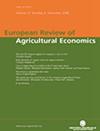在计量经济学分析中嵌入理论和量化不确定性的概率编程
IF 3.5
2区 经济学
Q2 AGRICULTURAL ECONOMICS & POLICY
引用次数: 0
摘要
实证研究中的复制危机要求我们对如何应用和报告统计模型采取更加谨慎的态度。要使实证研究产生持久的(政策)影响,这些问题至关重要。在本文中,我们提出了概率编程(Probabilistic Programming,PP)这一前进方向。概率编程工作流程具有明确的数据生成过程,可加强模型假设的交流、代码测试以及理论与估算之间的一致性。通过简化贝叶斯分析,它还为不确定性的解释、交流和建模提供了优势。我们概述了PP的优势,以鼓励在我们的社区中采用PP。本文章由计算机程序翻译,如有差异,请以英文原文为准。
Probabilistic programming for embedding theory and quantifying uncertainty in econometric analysis
The replication crisis in empirical research calls for a more mindful approach to how we apply and report statistical models. For empirical research to have a lasting (policy) impact, these concerns are crucial. In this paper, we present Probabilistic Programming (PP) as a way forward. The PP workflow with an explicit data-generating process enhances the communication of model assumptions, code testing and consistency between theory and estimation. By simplifying Bayesian analysis, it also offers advantages for the interpretation, communication and modelling of uncertainty. We outline the advantages of PP to encourage its adoption in our community.
求助全文
通过发布文献求助,成功后即可免费获取论文全文。
去求助
来源期刊

European Review of Agricultural Economics
管理科学-农业经济与政策
CiteScore
6.60
自引率
5.90%
发文量
25
审稿时长
>24 weeks
期刊介绍:
The European Review of Agricultural Economics serves as a forum for innovative theoretical and applied agricultural economics research.
The ERAE strives for balanced coverage of economic issues within the broad subject matter of agricultural and food production, consumption and trade, rural development, and resource use and conservation. Topics of specific interest include multiple roles of agriculture; trade and development; industrial organisation of the food sector; institutional dynamics; consumer behaviour; sustainable resource use; bioenergy; agricultural, agri-environmental and rural policy; specific European issues.
Methodological articles are welcome. All published papers are at least double peer reviewed and must show originality and innovation. The ERAE also publishes book reviews.
 求助内容:
求助内容: 应助结果提醒方式:
应助结果提醒方式:


